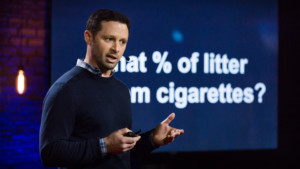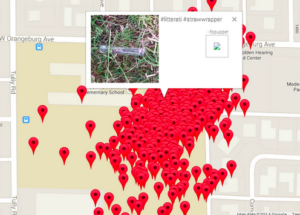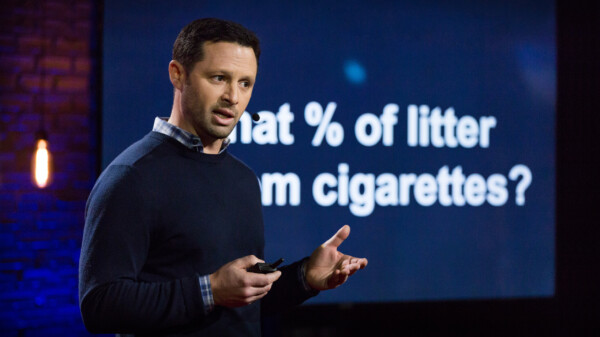Trashless spoke to Jeff Kirschner, founder of Litterati, the mobile app that encourages users to pick up and track litter. Litterati’s 3 million plus users have recorded 3.7 million items of litter and the app is heel simple to use.Just take a picture of a piece of litter, and the app immediately marks it with a geo-tag and time stamp. Users can include more details identifying what it is (a plastic bag, a beer can, etc.) and it’s all logged in a global database.

Jeff Kirschner speaks at TED Resident’s Salon, December 13, 2016, New York, NY. Photo: Ryan Lash / TED
T: I watched your Ted Talk, where you commented that litter seems to be the backdrop to our lives, but what if we brought it to the forefront? Could you tell me more?
J: For us it’s about making the invisible visible and bringing what we have noticed to the forefront. This allows people to put solutions in place, because you can’t do much about it (the problem of litter) until you can understand it. Like if I tell you Amsterdam is a dirty city with cigarettes lining the streets, you might not believe me, but if I show you here’s the brand break down and the exact location I found them, you’ll believe me. This empowers people.
T: How does it empower people exactly?
J: It’s the difference between telling someone it exists and showing them first-hand it exists. For example, Dirk Groot of Zwerfinator is one of many Dutch Litterati users who tracked Antaflu (throat lozenges) because he found their plastic wrappers all over the place. He mobilized and picked up 20,000—it’s actually one of the top brands in our database—mapped it and then went to the CEO of the company with the data. If Dirk had walked in and said, “your wrappers are all over the place,” the CEO might have been skeptical. But Dirk had the data and as a result, the CEO committed to changing the wrapping from plastic to paper.
T: It sounds like Litterati is a helpful tool because you can’t really argue with data, it’s neutral. It’s like a camera will record something and whatever you think of it doesn’t change the fact that it was recorded.
J: Exactly. Data is the truth because it creates transparency. It’s not about being for or against something, it’s about showing reality. In that sense, we consider Litterati a neutral-leaning activist organization.

T: I’m curious, what are the Top 5 pieces of litter people find?
J: Plastic, cigarette butts, paper, cans and bottles, and the most common brands are McDonalds, Redbull, Marlborough, Coke, Antaflu and Heinneken.
T: Does litter say more about the consumer who uses the product, or the company and the kind of packaging it creates? Where does the responsibility really fall?
J: It’s a simple question but the answer is complex. I see it as a shared responsibility. Can I blame McDonalds if I buy a burger and then throw the wrapper on the ground? No, but McDonald has a shared responsibility creating packaging that’s sustainable. Cities also share that responsibility by creating infrastructure that can handle waste. At the end of the day it’s all just people, it’s about having a conversation with people. It’s less about ‘don’t litter’ and more about the impact all of this has on our lives. Litterati isn’t into blaming or pointing fingers. We are into partnerships with committed individuals and organizations who are ready to put their resources, time, and effort into solving this problem.
T: I think Litterati, just like Trashless, is on the forefront of making change do-able, by letting people know they’re not alone. What do you think?
J: We both share a common value in that we both empower individuals by connecting them with a broader community of like-minded people. I would say individually you make a difference. Together we create an impact.
T: Thanks for the interview!
J: Thanks for spreading the word about Litterati!
Check out more interviews and reports from Trashless.Earth

